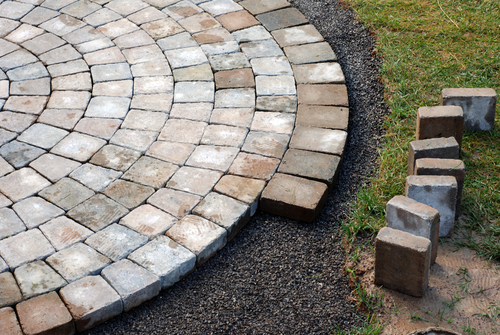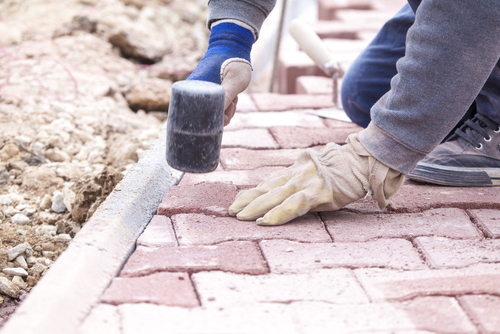What Kind of Base Should You Use for Patio Pavers?
January 10
Building a patio in your backyard is a great way to make your outdoor space more enjoyable and appealing. Still, you will have to start off your patio building project right if you want to get the most out of it. The first step should be choosing the right base material for your patio pavers.
While many homeowners choose to tackle their patio building themselves, this kind of work requires a high level of expertise and precision. If you want to achieve the best results with your outdoor patio, hiring seasoned experts to install your patio pavers in San Diego is the best path to take.
Not only will they conduct the installation process with unparalleled precision, but they’ll also be happy to give you all the patio advice you may need, whether you want to know if you can build a patio without a permit or what the best size for a patio is.
 Choosing a suitable base material is a must if you want to provide a sturdy foundation for your pavers and ensure they stay in place for as long as possible. Professional paver installers use a variety of base materials, including:
Choosing a suitable base material is a must if you want to provide a sturdy foundation for your pavers and ensure they stay in place for as long as possible. Professional paver installers use a variety of base materials, including:
 As the best landscaping company in the region, Pacific Dreamscapes boasts a team of industry experts who know all the ins and outs of installing patio pavers. With their help, your landscaping dreams will become a reality in no time, whether you want a patio or driveway that resembles the look of Seaport Village or want to go with a more modern look.
Reach out to Pacific Dreamscapes today!
As the best landscaping company in the region, Pacific Dreamscapes boasts a team of industry experts who know all the ins and outs of installing patio pavers. With their help, your landscaping dreams will become a reality in no time, whether you want a patio or driveway that resembles the look of Seaport Village or want to go with a more modern look.
Reach out to Pacific Dreamscapes today!
What is the best material for paver base?
 Choosing a suitable base material is a must if you want to provide a sturdy foundation for your pavers and ensure they stay in place for as long as possible. Professional paver installers use a variety of base materials, including:
Choosing a suitable base material is a must if you want to provide a sturdy foundation for your pavers and ensure they stay in place for as long as possible. Professional paver installers use a variety of base materials, including:
- Crushed stone: if your patio will be used more extensively, a crushed stone base would be a good option to go with. This base material is great for all kinds of patio pavers, but you should make sure to pick crushed stone specifically meant for paver installation.
- Sand: If you’re looking for a base that allows water to seep through then sand may be a good choice. However, a sand base is only suitable for a patio that won’t be too heavily used, so keep that in mind when choosing the base material.
- Compacted soil is a good idea only if you’re installing a patio for just one season. This is because a compacted soil base can allow the pavers to shift or sink unless the soil is properly compacted and cleared from weeds and grass.
- Stone dust is a base material that you should avoid if you can due to several reasons. The main problem with stone dust is its fine texture that can’t be compacted properly which leads to shifting and sinking.
Do I need sand under pavers?
Installing driveway or patio pavers without sand is not a good idea because the sand base serves as the main stabilizing material for your pavers. Without sand, the pavers are likely to shift and sink over time, resulting in an uneven and messy surface. The sand keeps the pavers in place, preventing unnecessary replacements and repairs, as well as keeping your patio free from tripping hazards.How many inches of sand do I need for pavers?
If you decide to install your patio pavers on a sand base, there are several considerations you should make. The amount of sand you use can make or break your paver installation, so it’s best that you use no more than the recommended 1 inch. Here’s why:- A sand layer that is too thick can create waves in your patio during the installation.
- Pressing pavers into a thick sand bed may result in misalignment and a messy look.
- Too much sand will make the joints of the pavers look uneven.
We install the best patio pavers in San Diego
 As the best landscaping company in the region, Pacific Dreamscapes boasts a team of industry experts who know all the ins and outs of installing patio pavers. With their help, your landscaping dreams will become a reality in no time, whether you want a patio or driveway that resembles the look of Seaport Village or want to go with a more modern look.
Reach out to Pacific Dreamscapes today!
As the best landscaping company in the region, Pacific Dreamscapes boasts a team of industry experts who know all the ins and outs of installing patio pavers. With their help, your landscaping dreams will become a reality in no time, whether you want a patio or driveway that resembles the look of Seaport Village or want to go with a more modern look.
Reach out to Pacific Dreamscapes today! 